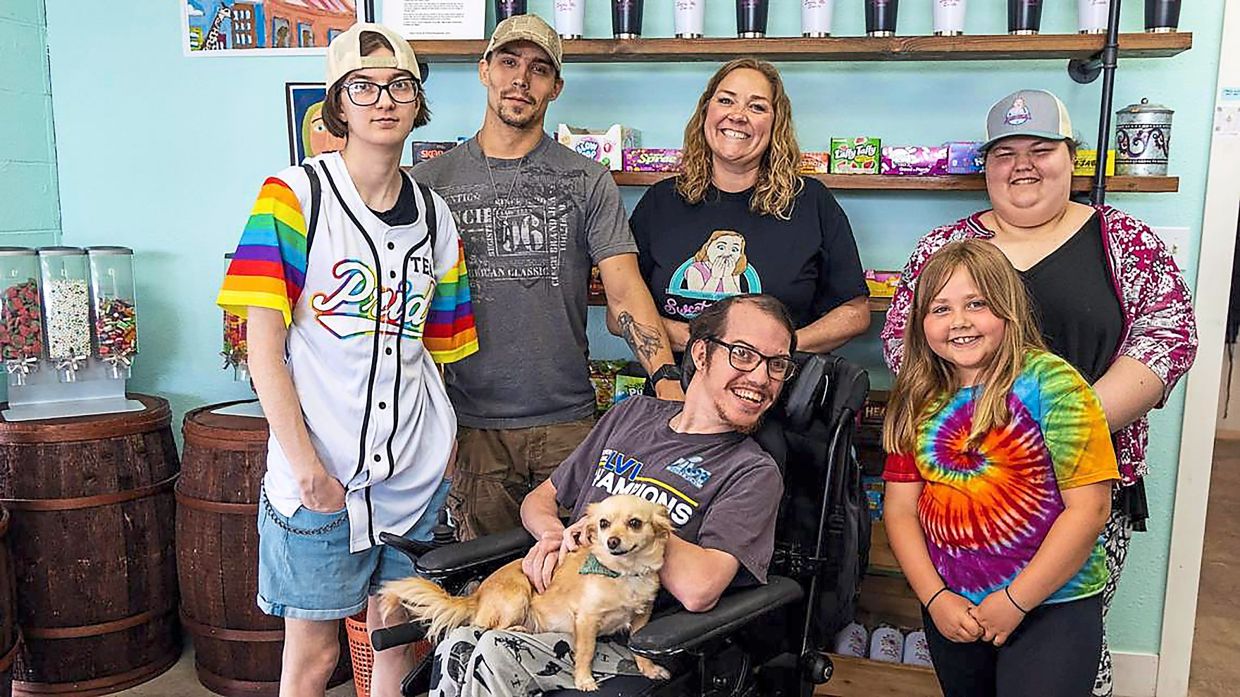Radovich (centre) gives back to the Idaho community by employing people with disabilities. Photos: TNS
Twice a week, Robin Boudwin gets on the Access bus, a paratransit transportation service, from her home in Boise, Idaho, the United States. She arrives at Sweet Zola’s Candy Shop at 7172 Fairview Ave, where she packages candy boxes, trains her colleagues or operates the register.
For the past two years, Boudwin has been working at Sweet Zola’s, a non-profit that aims to help its employees with disabilities learn vital workplace skills in a safe environment. Boudwin has had quadriplegia and said the job has given her more responsibilities than her previous job at a movie theatre in Las Vegas.
“It’s given me a sense of worth,” Boudwin said.
Cyndy Radovich is the founder and executive director of Sweet Zola’s, which is named after her daughter.
Currently, Sweet Zola’s has 26 part-time employees, though the business has employed more than 50 workers since it began in 2019.
The employees are paid US$10 (RM45) an hour and tips to the store go straight to the workers. Most of the employees also receive Supplemental Security Income (SSI), Radovich said.
SSI gives disabled individuals with limited incomes monthly payments and access to benefits like national health insurance Medicare.
The Blister Sisters, a community fitness group, recently organised a fundraiser and silent auction, which raised more than US$1,200 (RM5,433) for Sweet Zola’s and its employees. The store was also featured on TV programme Good Morning America, which increased its visibility and resulted in a US$10,000 (RM45,275) donation from entrepreneur Kim Pernell.
“It was really amazing and a little overwhelming,” Radovich said, adding that the money will in part be used for the store’s rent.
Radovich also began a candy box subscription, allowing the business to deliver its products anywhere in the US and expand its customer base.
Radovich said she used some of the donation funds to help start the subscription service.
However, Boise store faced some challenges during the pandemic.
Zola, Radovich’s four-year-old daughter frequently joins her mother at the shop and interacts with several of the employees.
Zola has grown up around workers with disabilities and learns from them, Radovich said.
“She stands up for kids at school who are being bullied because of their disabilities,” Radovich said. “She’s such a beautiful little soul, and she’s learning.”
Sweet Zola’s was located on North Main Street in Boise. However, in 2020 during the pandemic, the space they shared with Potter’s Tea House closed. Radovich had to search for a new location and found one on Fairview Ave.
Radovich discovered the storefront on her 40th birthday and called the landlord for a tour.
“The landlord had tonnes of interest, but he liked me for some reason,” Radovich said.
“He liked what we were doing, and he immediately said yes.”
But Radovich said she struggled financially when she opened her new shop. Through her other job, working as a behavioural therapist for teenagers, she said she was able to support the store. She said despite the challenges, she’s thankful for the second chance at keeping her business alive.
“I thought that when I opened the business, I would be making enough money to pay myself,” Radovich said.
“To be perfectly honest, I hire everyone, and so I have so many employees that instead of paying myself, I pay them.”
But deciding to become a non-profit was a tough choice. Radovich said she didn’t want to be seen as a charity and wanted to show that workers with disabilities are willing to work for their money.
“We have to work just as hard as anyone without a disability because we’re proving that disability does not mean that we can’t be the same thing as anyone else,” Radovich said.
Radovich said that someday, she hopes to eventually acquire a larger area to create a better community space for her workers.
“Most days I walk in, and my employees are clapping, and they’re smiling and they’re opening the door for me,” Radovich said. “It’s just a beautiful family.” – Idaho Statesman/Tribune News Service
Empowering abilities
Radovich (centre) gives back to the Idaho community by employing people with disabilities. Photos: TNS
The shop actively hires people with disabilities to work at the store.
Sweet Zola’s Candy Shop employee Evie Heckthorn packs monthly subscription boxes at the store.
— Photo: TNS








